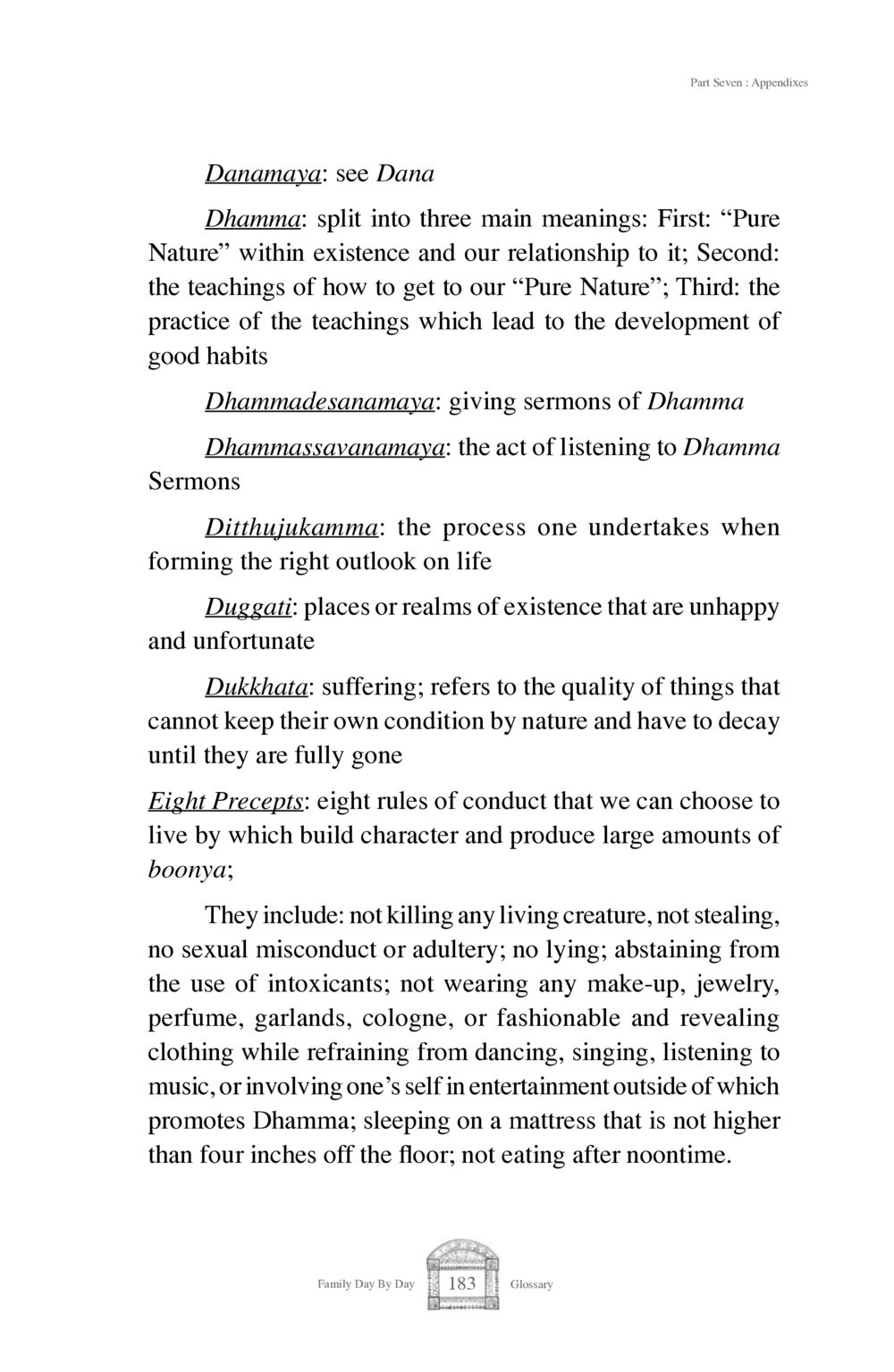Glossary of Dhamma Terms : หน้า 185/216
Family Day By Day : หน้า 185/216 A comprehensive glossary defining key concepts in Dhamma and the Eight Precepts for spiritual practice.
0 ครั้ง

สรุปเนื้อหา
This appendix provides definitions for crucial terms related to Dhamma, including the meaning of Dhama, the significance of giving sermons, the process of forming right outlooks, and the concept of suffering (Dukkha). It also outlines the Eight Precepts, essential ethical guidelines to cultivate good character and enhance spiritual growth. The Eight Precepts focus on non-violence, honesty, and moderation, as well as abstaining from distractions that hinder spiritual progress. For more detailed discussion, visit dmc.tv.
หัวข้อประเด็น
-Dhamma meanings
-Dhammadesanamaya
-Dhammassavanamaya
-Eight Precepts
-Dukkhata
ข้อความต้นฉบับในหน้า
Part Seven: Appendixes
Danamaya: see Dana
Dhamma: split into three main meanings: First: "Pure
Nature" within existence and our relationship to it; Second:
the teachings of how to get to our "Pure Nature"; Third: the
practice of the teachings which lead to the development of
good habits
Dhammadesanamaya: giving sermons of Dhamma
Dhammassavanamaya: the act of listening to Dhamma
Sermons
Ditthujukamma: the process one undertakes when
forming the right outlook on life
Duggati: places or realms of existence that are unhappy
and unfortunate
Dukkhata: suffering; refers to the quality of things that
cannot keep their own condition by nature and have to decay
until they are fully gone
Eight Precepts: eight rules of conduct that we can choose to
live by which build character and produce large amounts of
boonya;
They include: not killing any living creature, not stealing,
no sexual misconduct or adultery; no lying; abstaining from
the use of intoxicants; not wearing any make-up, jewelry,
perfume, garlands, cologne, or fashionable and revealing
clothing while refraining from dancing, singing, listening to
music, or involving one's self in entertainment outside of which
promotes Dhamma; sleeping on a mattress that is not higher
than four inches off the floor; not eating after noontime.
Family Day By Day 183 Glossary
หน้าหนังสือทั้งหมด

1

2

3

4

5

6

7

8

9

10

11

12

13

14

15

16

17

18

19

20

21

22

23

24

25

26

27

28

29

30

31

32

33

34

35

36

37

38

39

40

41

42

43

44

45

46

47

48

49

50

51

52

53

54

55

56

57

58

59

60

61

62

63

64

65

66

67

68

69

70

71

72

73

74

75

76

77

78

79

80

81

82

83

84

85

86

87

88

89

90

91

92

93

94

95

96

97

98

99

100

101

102

103

104

105

106

107

108

109

110

111

112

113

114

115

116

117

118

119

120

121

122

123

124

125

126

127

128

129

130

131

132

133

134

135

136

137

138

139

140

141

142

143

144

145

146

147

148

149

150

151

152

153

154

155

156

157

158

159

160

161

162

163

164

165

166

167

168

169

170

171

172

173

174

175

176

177

178

179

180

181

182

183

184

185

186

187

188

189

190

191

192

193

194

195

196

197

198

199

200

201

202

203

204

205

206

207

208

209

210

211

212

213

214

215

216
หนังสือที่เกี่ยวข้อง
Load More
